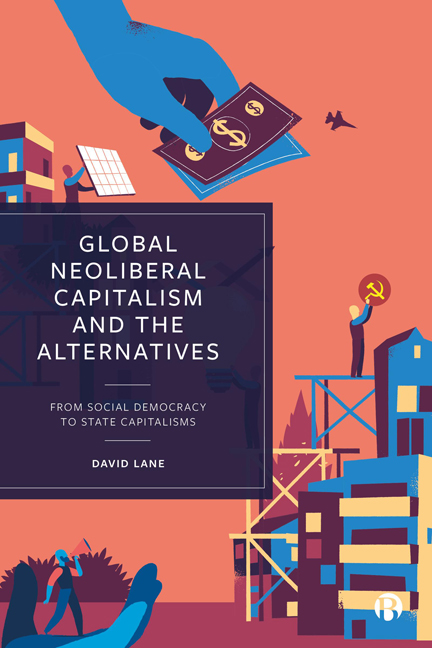Book contents
- Frontmatter
- Contents
- List of Figures, Tables and Boxes
- About the Author
- Acknowledgements
- 1 Introduction
- 2 Global Neoliberalism and What It Means
- 3 Neoliberalism: A Critique
- PART I Socialist Contenders and Their Demise
- PART II Capitalist Globalisation and Its Adversaries
- Appendix 16A Social Formations: Patterns of Coordination and Control
- Appendix 16B Regulated Market Socialism
- Index
10 - The Changing Global Class Structure and the Challenge of the Semi-Core
Published online by Cambridge University Press: 20 January 2024
- Frontmatter
- Contents
- List of Figures, Tables and Boxes
- About the Author
- Acknowledgements
- 1 Introduction
- 2 Global Neoliberalism and What It Means
- 3 Neoliberalism: A Critique
- PART I Socialist Contenders and Their Demise
- PART II Capitalist Globalisation and Its Adversaries
- Appendix 16A Social Formations: Patterns of Coordination and Control
- Appendix 16B Regulated Market Socialism
- Index
Summary
The role of states in defining foreign and domestic policy is widely believed to have declined with the rise of global capitalism. The ruling classes are reconstituted on a global basis. The power of transnational companies, global agreements transferring power to international agencies, and a reliance on market (rather than political) forces, it is claimed, have weakened the role of states. In encouraging an open competitive playing field, liberalism promotes the unrestricted movement of capital and severely limits state support for national companies – thereby undermining economic ideologies such as Keynesianism and economic nationalism, which are state centric. As a consequence of the displacement of national companies by international ones, governments have less need to negotiate a compromise between their national bourgeoisie and the national working class. The expansion of liberal economic blocs (such as the EU and the Eurasian Economic Union) and the pervasive influence of international organisations draw countries into global and overlapping regional networks. Consequently, social security provided by state full employment policies, welfare state benefits and statefinanced old aged pensions are not promoted by national governments. The major concern of national governments is to fulfil the monetary and economic rules laid down by regional (such as the European Union) and international bodies (such as the International Monetary Fund and the World Trade Organization). The onus of social security is put on individuals to make personal provision. These developments are the underlying causes of the decline of social democratic governments that promoted a welfare agenda. Moreover, whereas national economies have democratic oppositions of varying strengths, political classes and elites operating on a global scale are not subject to such countervailing powers. The cause of this disjunction is that all citizens have only one vote in national elections, whereas corporations have as many votes as the size of their capital -money can buy political power.
But the conclusion that nation states have lost their power to an amorphous market is not fully warranted. States retain major powers which include a monopoly over the definition of citizenship, the use of internal lethal weapons and military force, the preservation of national boundaries and the declaration of war. These powers give states considerable powers, at least to some states, in international affairs. Contemporary events – the COVID-19 pandemic, the war in Ukraine, controls over environmental conditions – are regulated by states.
- Type
- Chapter
- Information
- Global Neoliberal Capitalism and the AlternativesFrom Social Democracy to State Capitalisms, pp. 183 - 198Publisher: Bristol University PressPrint publication year: 2023

